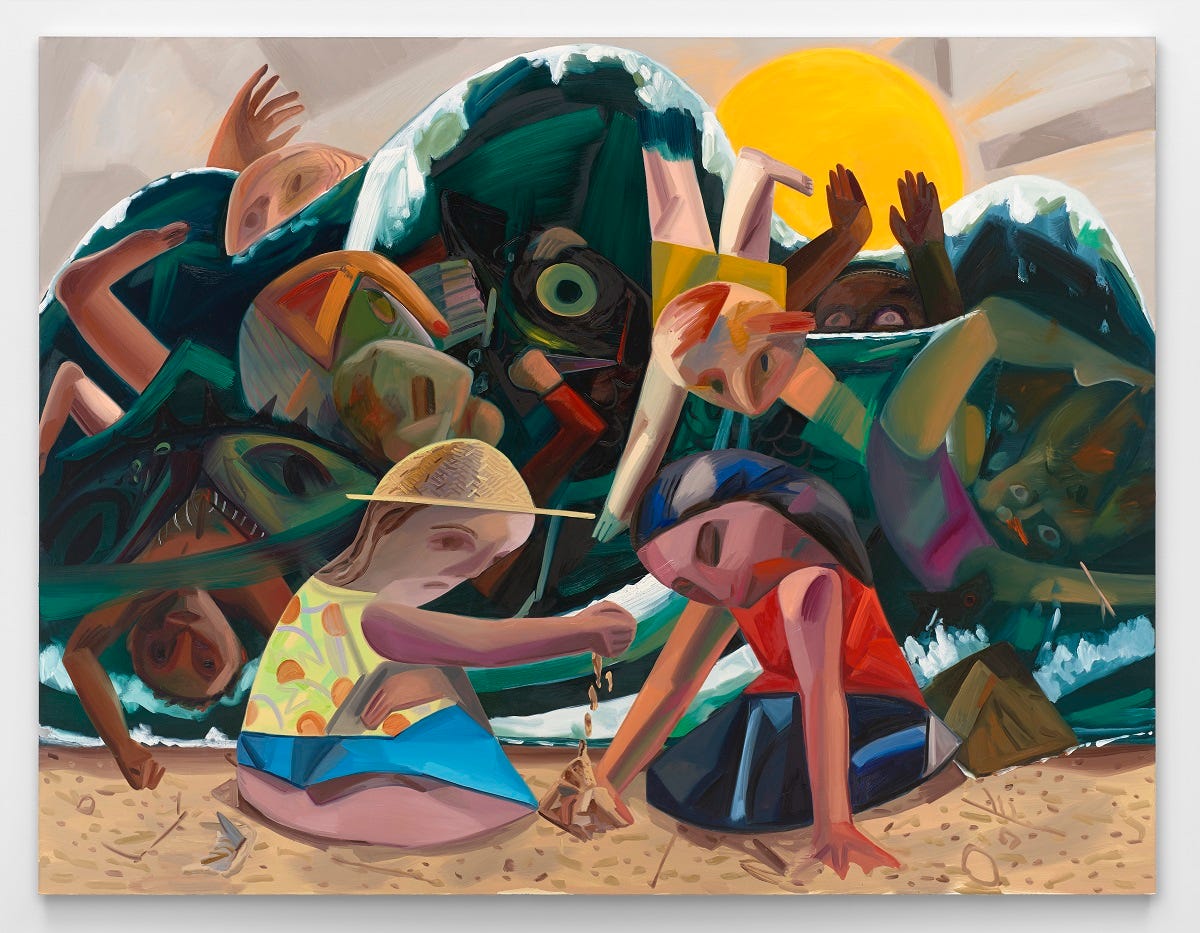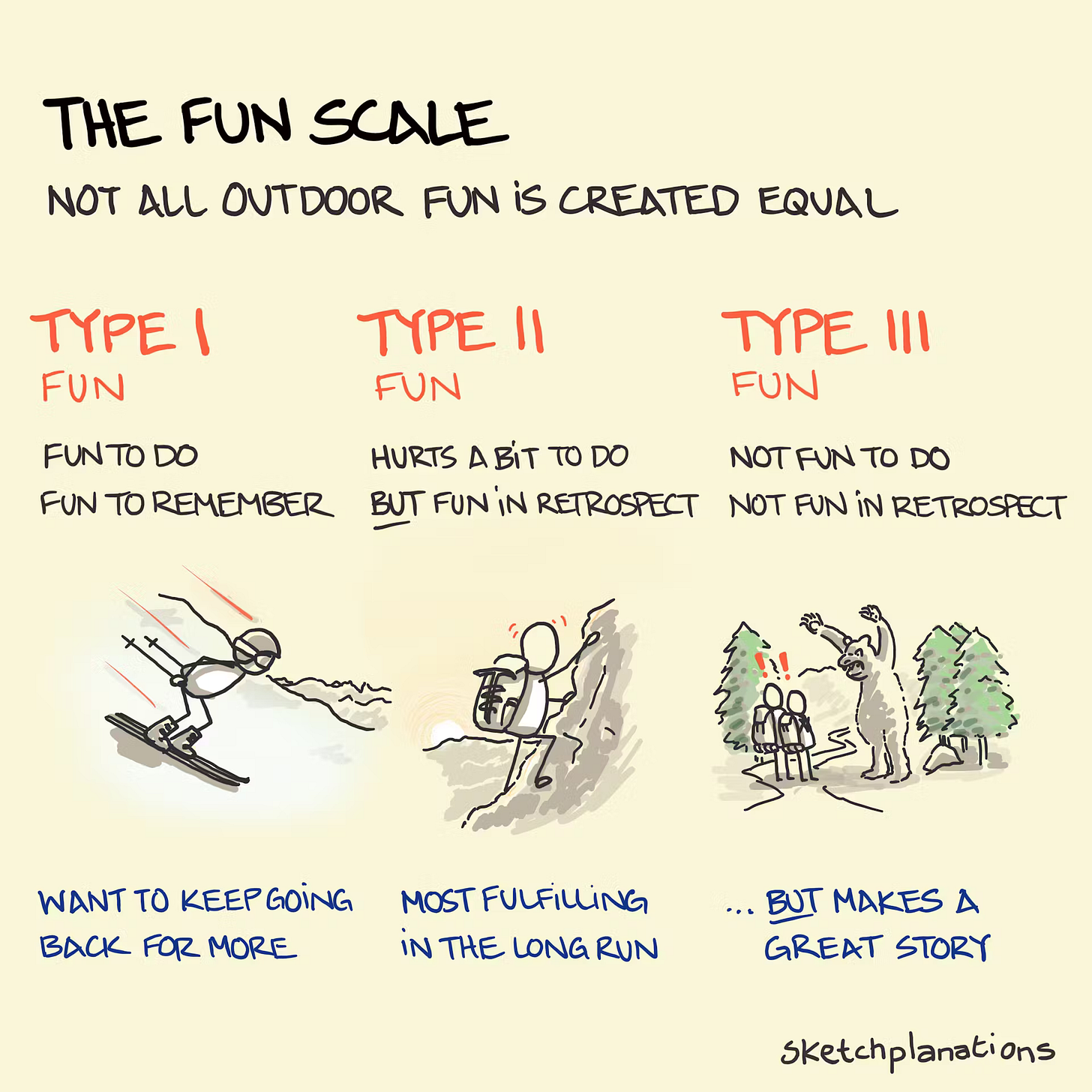Radical fun
the friendship theory of everything: longform edition
Dana Schutz, Big Wave, 2016
tl;dr: I’m going to do a series on friendship (a serialized book, as it were) on Bookbear Express for the next many weeks. Read on if you’re interested :)
i. What’s the point of it all?
On Tuesday my therapist wondered if I was too upbeat. I’d been telling her about how I’d finally thrown myself into coaching with some intensity after dabbling for a while. In the past couple of months, I’d been doing quite a few things intensely: yoga, jiu-jitsu, attending parties, throwing parties, matchmaking, coaching, writing the Substack, working on a new book. I was hanging out with my friends like it was my full-time part-time job.
“You can sit with change and grief, you know,” she said. She was alluding to the fact that my romantic life was in shambles. Also, my agent had just told me the latest edits on the manuscript could be, uh, improved.
“That’s true. It’s just… I just really like having fun,” I mumbled to her. “Like, I sort of think the point of life is to have fun.” I flashed back to two years ago, when I was on a walk with a boy somewhere south of San Francisco and he was asking me why I was working at an astrology startup. “Because it’s funny,” I said. He looked bemused.
My therapist got it. She is a woman who intuitively understands how things are linked even when I’m inarticulate. “You just really value connection,” she said.
It clicked at that moment: I said I liked fun, but she understood it as liking connection. I had never realized that for me the two were one.
*
I am deeply passionate about having fun. Some people are ambitious about the impact of their work; I am ambitious about how much fun I’m having. My personal definition of fun is the intersection of excitement, pleasure, and fulfillment.
I’m sure you’ve heard about Type I, Type II, and Type III fun. In my opinion, a healthy “fun schedule” includes an even distribution of all three. I care a lot that my day-to-day experience is fairly pleasurable, hence my rather unorthodox career. I don’t want to be on Slack. I don’t like being in meetings all day. I prefer to work in the comfort of my apartment so I can take frequent dance breaks. However, I also make a living as a writer, and I can promise you that longer writing projects are squarely Type II fun. Some mornings I open my Google doc and my outlook is grim. I do not find running pleasurable almost ever, but I still try to run regularly, because it’s fun to be able to run. Being a writer is a perk when experiencing Type III fun, which I try not to seek out but sometimes find me: have you ever suffered so badly you start laughing because it’s such a good story?
I like to think of hard work as a way to access rarified forms of fun. I mean, what else would make the suffering worth it? People who’ve achieved mastery have a lightness to their depth I find totally hypnotic: they love what they do, and they have an access to a depth of knowing both physical and emotional that the rest of us can’t imagine. That depth, authority and experience is fun. Suffering can be in service of hedonism.
So, if someone asks me, What’s the point of it all? My answer, now and always, is having fun.
ii. Fun is a skill
Everyone agrees that fun is good. Yet I’m sure we can all agree that most people do not seem to be having fun the majority of the time. This is because having fun, or at least having a balanced fun portfolio, is a skill. Most people tend to default to easy dopamine: scrolling Tiktok, online shopping, playing video games. Because they associate fun with guilt and a lack of productivity, they split their lives into two: “productive time” (hard, not fun) and “fun time” (semi-horizontal on the couch with barbecue chips and Love Island).
What I want to advocate for is a life filled with different types of fun. Where you consistently have Type I, II, and III fun across the realms of relationships, work and hobbies.
Now, if you are someone who is not currently having a great deal of fun in any area of your life, you might be thinking: That’s all well and good, but I haven’t the faintest clue of how to achieve that.
That’s where friendship comes in.
The truth is, connection is the heart of fun. And for most of us, friendship is our entrypoint into connection. Even if you don’t feel connected to your work and are struggling to find the right romantic partner, friendship is probably something that is accessible to you, if you approach it with a proactive strategy and open heart.
iii. We live in a world that doesn’t value friendship
It is not a hot take, certainly, to be pro-friendship. And yet I can’t help but feel that we live in a world where people pay lip service to the value of friendship but rarely make it the center of their lives. Most people pick up friends as casual artifacts from high school, college, or the workplace, evidence that they're normal people with normal social lives, people who are capable of hanging out. Friends can be sacrificed to the whims of a romantic partner; friendships can be easily discarded as two people naturally “drift apart.” Friends are many tiers below work or marriage or kids.
I’m often astonished by our culture’s cynicism about friendship. Exes shouldn’t be friends; people of the opposite gender should not be friends; friendship is what people settle for when they can’t date someone. When I offer evidence to the contrary (for instance, that I have multiple guy friends who I’ve known for a decade and no one is secretly pining for anyone else), I hear things like, “But your friendships aren’t the norm, and the people you’re friends with aren’t the norm.” As if my friends are something that fell down from heaven and hit me in the face. As if they’re not the result of time, patience, repetition and yearning.
Fun is a skill. Friendship is also a skill.
We live in a culture that expects friendship to be easy. In fact, many people have said as much directly to me:
“Family is hard, friendship should be easy and effortless.”
“I fight with my partner, there’s no way I’m going to fight with my friends.”
“Isn’t the whole point of friendship that you don’t have to think about it?”
But friendship cannot be the bedrock of your life if you treat it as an afterthought.
iv. Why should you value friendship?
Up until this point, my proposition might seem rather arbitrary. Sure, friendship is one way to have fun, but there are many other ways. Why not prioritize work or your boyfriend or your parents? Why not let friendship be something that’s part of your life, but hardly its main focus?
In my mind, there are a few important reasons.
The first is perspective. Nick said it perfectly with this tweet: most people i know gain like 20 iq when advising their friends lives and lose 20 iq when doing strategy for their own lives
Charlie gave me the same critique: Ava, you give amazing advice, but you don’t always follow your own advice.
Your friends can tell when you’re having fun and when you aren’t. Yes, you are the foremost authority on your own lived experience, but you have a thousand reasons to lie to yourself. Your friends don’t: all they do is experience you. If you encourage them to be honest, they can tell you when you’re bullshitting yourself.
The second is connection.
I truly believe that all trauma is healed relationally; your friends can help you connect to your sense of aliveness and joy. They can also show you what healthy attachment looks like if you have a lot of attachment trauma. For most of us, it’s impossible to have fun or feel happy if we aren’t connected to community.
The third is aspiration: your friends show you what’s possible.
The first tenet of the friendship theory of everything is: You accept that in choosing who you spend time with you choose who you are.
On some level that’s scary: you might think, Hey, can’t I just like my friends without wanting to be them? On the other hand you might find it exhilarating: I could be different by choosing different friends.
Honestly, I dropped out of college because I became friends with people who dropped out of college. And I probably started writing partially because my friends were like, It’s so obvious that you should write. Even though I myself was like: I can’t do that! No one makes a living writing!
My friends expand my sense of what’s possible week over week, year over year. I’m amazed by them.
When you make friendship foundational, that combination of perspective, connection, and aspiration can help you figure out everything else in your life. Work, friends, hobbies, location, even family: friendship can be the key to everything else. But only if you let it be.
v. Friendship as a creative act
Good friendships are inherently creative, so why shouldn’t writing about them be?
Books used to be serialized; I have been thinking lately that maybe we should serialize them again. (Bleak House truly only makes sense when you conceive of it as serialized). So: I’m going to attempt to write a book on Substack and we’ll see how it goes.
Here are the chapters as I’ve currently plan them:
The Favorite People Model of the World / The Friendship Theory of Everything
How do I meet more people I like?
How do I become better friends with someone without being weird?
Is friendship romantic?
Friendship maintenance
Deciding to have more in common with your friends
Living near friends
Work and friends
Tripping with friends (both ways)
How friends can help you meet your partner
Friends and family
Conflict with friends
Friendship breakups
What does it mean to build enduring friendships?
This is tentative—I’ll make it up as I go along. What I do know is that I’ll be sharing my own experiences, interviewing friends, and writing about great friendships i’m not part of. I will endeavor to produce a chapter every two weeks, and each will be around 3000~ words long. This will be for paid subscribers! So: subscribe if you’re interested :)
Feel free to offer suggestions and tell me what you’d like to see. Thanks as always for your attention, support and love.




Corollary of the first tenet is that in choosing what you spend your time on you also influence who your friends become!
This sounds like a brilliant idea.